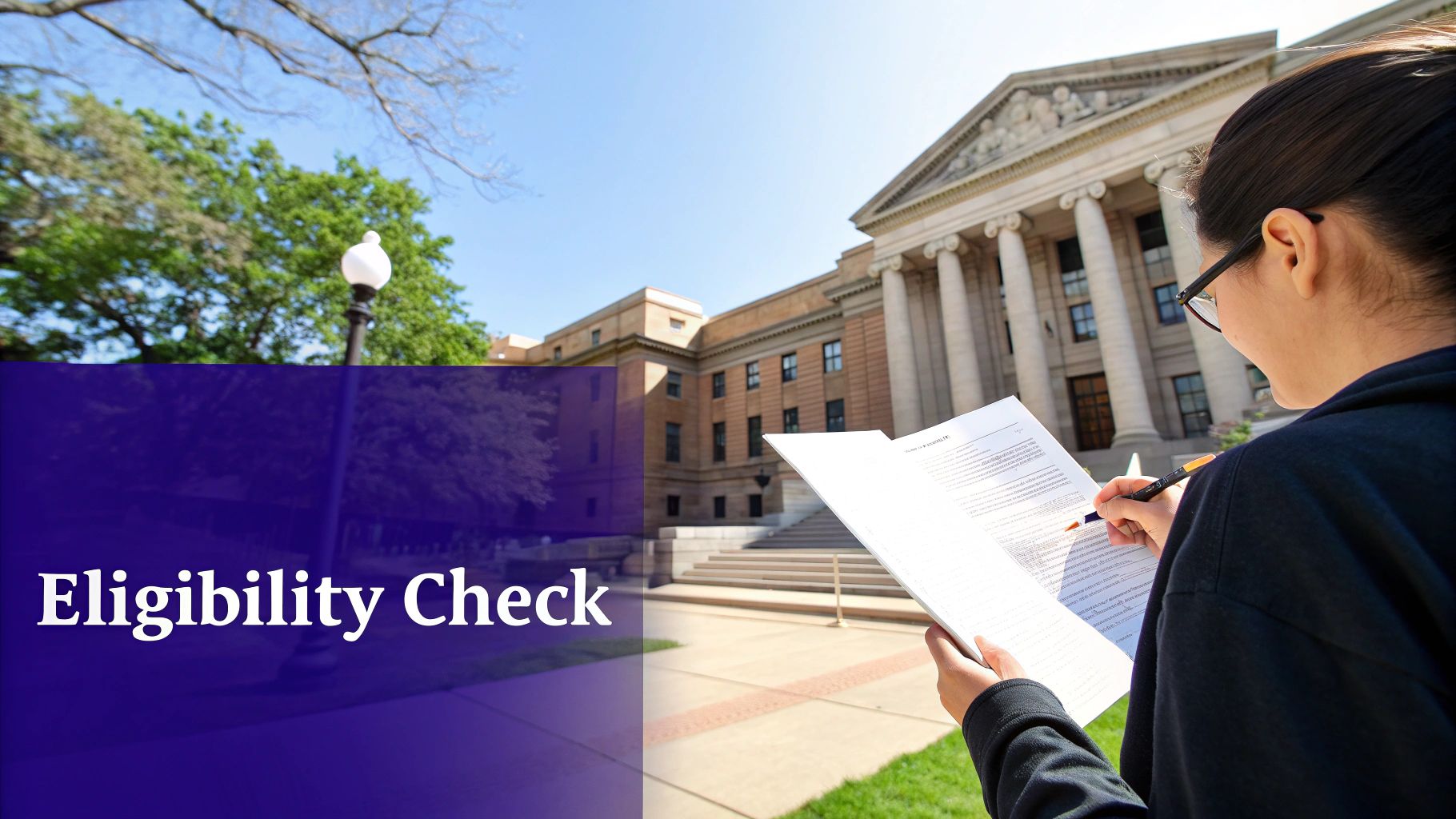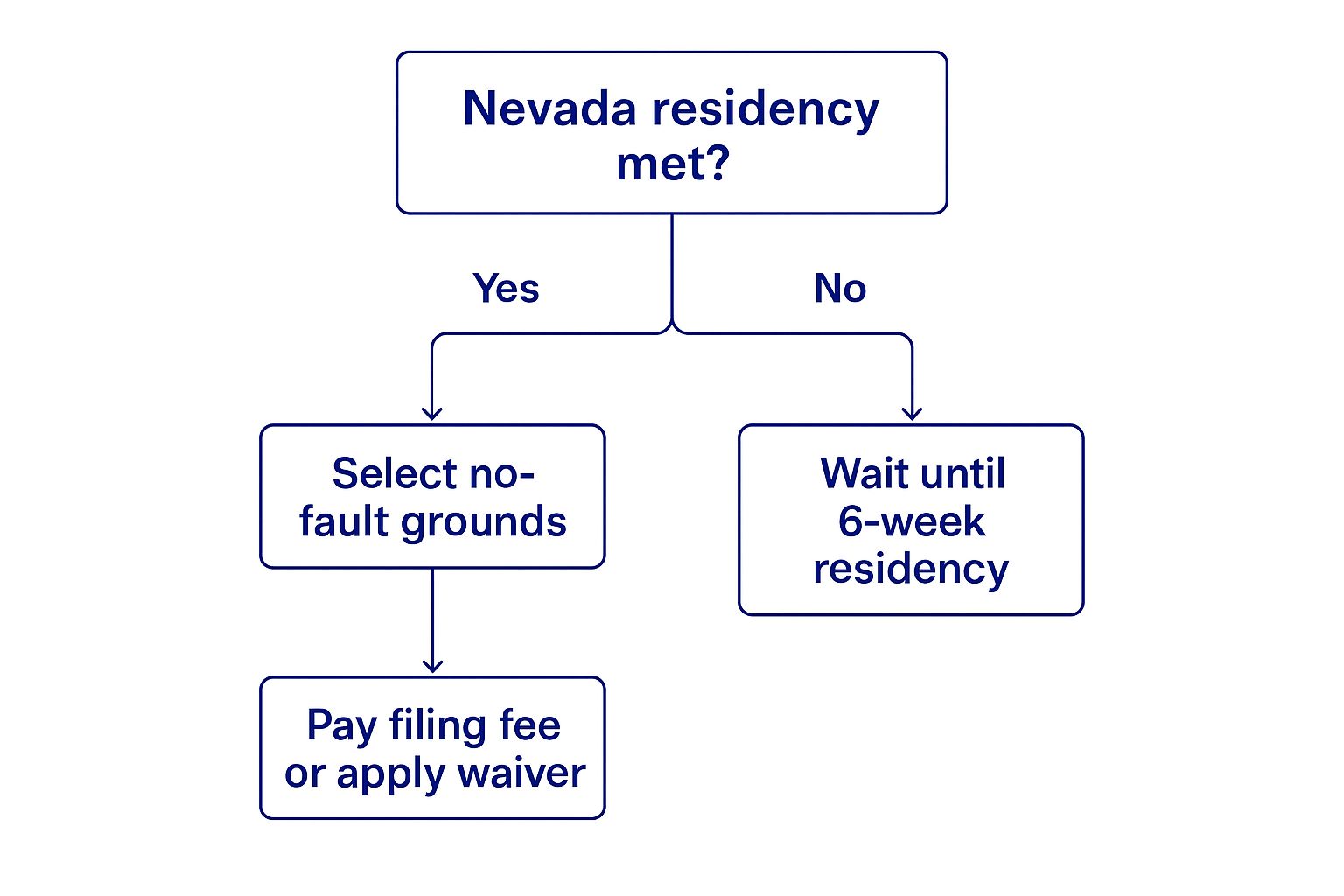How to File for Divorce in Nevada The Simple Way
- omgitzgodzeera
- Jul 25, 2025
- 17 min read
So, you're thinking about filing for divorce in Nevada. The good news is that Nevada has one of the most straightforward divorce processes in the country. The first, and most important, hurdle is the residency requirement. Before you can file any paperwork, at least one spouse must have lived in the state for a minimum of six weeks.
That's it. This short residency period is a big reason why Nevada is known for quick divorces.
What to Know Before You File for a Nevada Divorce

It's no secret that Nevada has a reputation for being a destination for both tying the knot and untying it. The state's laws are designed to be efficient, which contributes to its high divorce rate. In fact, in 2021, Nevada recorded the highest rate in the U.S., with about 4.2 divorces per 1,000 females aged 15 and older. You can explore more data on these state-by-state trends to see just how unique Nevada's situation is.
Beyond the six-week residency rule, another key piece of the puzzle is Nevada’s "no-fault" status. This is a game-changer. It means you don't have to prove that your spouse did anything wrong to end the marriage.
You simply need to state one of two reasons:
You and your spouse are incompatible (meaning you just can't get along anymore).
You have lived separate and apart for at least one year.
My Takeaway: The "no-fault" rule is a huge relief for most people. It shifts the focus from a blame game to finding practical solutions. Instead of arguing about who did what, you can concentrate on dividing assets and creating a parenting plan, which saves a ton of emotional and financial energy.
This approach really sets the stage for a more civil and less stressful separation, especially if you and your spouse are mostly on the same page.
To help clarify these core ideas, here’s a quick summary of what you need to know.
Nevada Divorce Requirements at a Glance
Requirement/Concept | What It Means in Nevada | Key Takeaway |
|---|---|---|
Residency | At least one spouse must have physically lived in Nevada for a minimum of six weeks before filing. | This is one of the shortest residency periods in the country, making Nevada an accessible option for many. |
Grounds for Divorce | Nevada is a "no-fault" state. You only need to claim incompatibility or living separately for one year. | You don't need to prove wrongdoing like adultery or abandonment, which simplifies the process significantly. |
Uncontested Divorce | Both spouses agree on all terms (property, debt, custody) and file a Joint Petition together. | This is the fastest, cheapest, and least stressful path to divorce. It requires full cooperation. |
Contested Divorce | Spouses disagree on at least one issue. One spouse files a Complaint for Divorce and serves the other. | This route involves court hearings, potential mediation, and is more time-consuming and expensive. |
As you can see, the path you take largely depends on how well you and your spouse can cooperate.
Uncontested vs. Contested Divorce: The Big Decision
The single most important decision that will shape your divorce is whether it will be uncontested or contested. This choice impacts everything—the timeline, the cost, and the overall stress level.
An uncontested divorce is the ideal scenario. It's when you and your spouse have worked out all the major issues ahead of time and are ready to sign a Joint Petition. Think of it as telling the court, "We agree on everything and just need you to finalize it."
A contested divorce, on the other hand, is what happens when you can't agree. If you're at a stalemate over who gets the house, how to split a retirement account, or custody arrangements, one person must file a Complaint for Divorce. This kicks off a formal legal battle where a judge will ultimately make the decisions for you.
For example, a couple who sits down and maps out their shared debts, divides their savings, and agrees on a co-parenting schedule can file a Joint Petition and be done in a matter of weeks. But if another couple is fighting over who is responsible for a $5,000 credit card bill, their case becomes contested and could drag on for months.
A Modern Approach to Your Divorce Paperwork
Getting the paperwork right from the start is absolutely critical. A simple mistake on a form can get your entire filing rejected by the court clerk, forcing you to start all over again. This is where virtual services can make a huge difference.
Online document preparation services are designed for this exact situation. Instead of trying to interpret dense legal forms yourself, these platforms walk you through a simple, question-based process entirely online. Your answers are then used to automatically generate the correct, court-approved documents tailored to your specific circumstances.
Even better, you can now get your documents notarized without leaving your house. Remote online notary services let you connect with a certified notary public via a secure video call. This is perfect for the Joint Petition, which requires both spouses' signatures to be notarized.
Combining online document prep with a remote notary creates a seamless, virtual, and efficient process. It helps you avoid common pitfalls and file with confidence, all from the comfort of your own home.
Choosing Your Divorce Path: Joint Petition vs. Complaint
When you decide to file for divorce in Nevada, one of the first and most critical decisions you'll make is how you'll file. This isn't just about paperwork; it's about the entire tone and trajectory of your divorce. The path you take hinges on a single, crucial factor: whether you and your spouse are in complete agreement.
Your answer to that question determines if you can pursue a smooth, amicable Joint Petition or if you'll need to go the more formal route of a Complaint for Divorce.
This quick decision tree can help you visualize the initial steps.

As you can see, meeting the basic residency and grounds for divorce requirements is just the beginning. The real work starts when you decide which set of documents to prepare and file with the court.
The Cooperative Route: A Joint Petition
A Joint Petition is the best-case scenario for an efficient, low-conflict divorce. It’s specifically designed for couples who have already worked everything out and are on the same page about every detail.
To go this route, you must have a complete agreement on:
Dividing property: Who gets the house, the cars, the investments, and the furniture.
Splitting debts: How you’ll handle credit card balances, loans, and the mortgage.
Child custody and support: A clear, detailed parenting plan and child support figures, if you have minor children.
Alimony (spousal support): Whether one person will pay support to the other, for how long, and exactly how much.
Think of it this way: Maria and David decided to end their 10-year marriage. They sat down at their kitchen table one weekend with a spreadsheet, listed all their assets and debts, and used Nevada's child support calculator to land on a fair amount for their two kids. Because they had everything settled, they were perfect candidates for a Joint Petition.
This path is faster, far less adversarial, and significantly cheaper, as it cuts out the need for lawyers to negotiate or argue in court. You're basically handing the judge a complete solution to sign off on.
Key Insight: A Joint Petition isn't just about saving money; it’s about preserving your sanity. By working together, you and your spouse keep control over the final outcome. You avoid handing that power to a judge who doesn't know you or your family's unique situation.
The Contested Path: A Complaint for Divorce
What if you can't agree? If there's even one major issue you and your spouse are stuck on, the divorce is considered contested. In this case, one spouse must file a Complaint for Divorce and then formally "serve" the legal papers to the other. This action is what officially kicks off the court proceedings.
Now, "contested" doesn't automatically mean you're headed for a dramatic courtroom battle. It simply means there are unresolved issues that need a formal process to sort out. This could involve mediation, hearings, or, in some cases, a trial where a judge makes the final decisions for you.
For instance, Sarah and Tom agreed on almost everything—except what to do with their shared small business. Because they were at an impasse, Sarah had to file a Complaint. This started a legal process where they would exchange financial documents and likely attend court-ordered mediation to try and resolve that one lingering dispute.
Why Your Paperwork Must Be Perfect
Whether you file a Joint Petition or a Complaint, the accuracy of your legal documents is absolutely critical. I've seen it happen countless times: a simple mistake—a missed signature, an incorrect calculation, or an outdated form—causes the court clerk to reject the entire filing.
When that happens, you’re forced to correct everything and start over, which adds frustrating delays and stress to an already difficult time.
This is where getting professional help with online document preparation can be a game-changer. Instead of trying to decipher complex legal forms on your own, a remote service can ensure every line is filled out correctly and meets the court's strict standards. For couples on the amicable path, it's often wise to explore consultation services for your joint divorce petition to get that final, expert review entirely online.
Ultimately, it’s about peace of mind. Getting an expert assist with the paperwork remotely ensures it's precise and ready for the court, freeing you up to focus on what really matters: moving forward with your life.
Getting Your Nevada Divorce Paperwork in Order

Once you’ve decided whether to file a Joint Petition together or have one person file a Complaint, it’s time to face the paperwork. This can feel like the most daunting part of the process, but don’t worry. We can break it down.
The single most important thing here is accuracy. The Nevada courts are incredibly specific about their requirements. One small mistake—a missed signature, a wrong date—can get your entire packet bounced, sending you right back to square one.
The Core Divorce Documents You'll Need
While the exact list of forms can differ a bit depending on your county or if you have kids, a few key documents form the foundation of every Nevada divorce filing. Think of these as the legal backbone of your case.
Here’s what you can generally expect to handle:
Family Court Cover Sheet: This is the face of your filing. It’s a simple form that gives the court clerk basic information about you, your spouse, and the type of case you’re starting.
Summons (only if you file a Complaint): If you're the one initiating the divorce with a Complaint, this is the official document that gets "served" to your spouse. It legally notifies them that you've started a divorce case.
Complaint for Divorce or Joint Petition for Divorce: This is the heart of your divorce. It lays out all the critical details: the legal grounds for divorce, how you want to divide property and debts, and what you’ve decided for your children.
Affidavit of Resident Witness: Nevada requires proof that at least one of you has lived here for a minimum of six weeks before filing. This is a notarized statement from a friend, coworker, or family member who can swear to it.
Decree of Divorce: This is the finish line. It’s the final order that the judge will sign to make your divorce official. You actually prepare this document yourself and submit it with your initial paperwork, ready for the judge's signature.
Keep in mind, this isn't an exhaustive list. If you have minor children, you'll also need to complete several other forms detailing custody, visitation schedules, and child support calculations.
A Smarter Way to Handle the Paperwork
Frankly, this is where many do-it-yourself filers get stuck. Legal forms are notorious for their confusing jargon and very specific instructions. It’s easy to overlook a checked box or miscalculate child support based on Nevada's strict guidelines, leading to an instant rejection from the clerk's office.
This is precisely why so many people now turn to virtual document preparation services. It's a modern, practical solution. Instead of you trying to become a paralegal overnight, these online services guide you through a simple Q&A process. You just answer questions about your situation in plain English from any device, and the platform generates the correct, court-ready forms for you.
Here’s a real-world example: Let’s say a couple, Maria and Tom, are filing a Joint Petition. They agree on almost everything but get tripped up on the proper way to word the division of a 401(k) and their daughter's visitation schedule. Using a virtual document prep service, they answer straightforward questions like, "Who will provide the child's health insurance?" and "How will the retirement account be split?" The service then automatically populates their Decree of Divorce with the precise legal phrasing the judge needs to see, avoiding a likely rejection.
This approach takes the guesswork out of the equation. It's like having a quality-control expert review your work, ensuring your documents are ready for the court the first time you submit them.
The Real Value of Professional Document Prep
The true benefit of using a professional document preparation service boils down to two things: accuracy and compliance. These experts live and breathe Nevada's court requirements, often down to the specific preferences of a particular county or judge. They know the common traps and how to steer you clear of them.
Take the settlement agreement, for instance. Whether it's in a Joint Petition or the final Decree, this section needs to be crystal clear. Vague language is a recipe for disaster and future legal battles. A document specialist ensures your agreement is written in unambiguous, legally sound language that protects both you and your ex-spouse.
For example, just writing "we'll split the credit card debt" is not good enough for the court. A properly prepared document will detail:
Which specific credit cards are included.
The exact balance owed on a particular date.
Who is responsible for paying each specific account.
What happens if one person defaults on their payment.
This level of detail is what saves you from major headaches down the road. By using professional help, you’re not just buying forms—you’re buying the peace of mind that comes from knowing your divorce is being handled correctly and efficiently from a remote, trusted provider.
Getting Your Documents Notarized and Filed Remotely
Once your divorce paperwork is filled out and ready to go, the next hurdle is making it all official. This means getting signatures notarized and then filing everything with the court. Not too long ago, this involved a series of time-consuming errands: finding a notary, scheduling an appointment both you (and maybe your spouse) could make, and then physically trekking down to the courthouse to hand it all in.
Thankfully, technology has completely transformed this part of the process. You can now get your Nevada divorce documents notarized and filed without ever having to leave home. Let’s talk about how these virtual services work and why they’ve become such a popular option.
The Power of Remote Online Notarization
One of the biggest game-changers has been Remote Online Notarization (RON). It’s a simple but brilliant concept: you meet with a certified Nevada notary public over a secure video conference to get your documents legally notarized. This is a lifesaver for anyone with a packed schedule, mobility challenges, or who simply doesn't live near a notary.
The process itself is surprisingly straightforward:
You upload your finished documents to a secure online portal.
Your identity is verified through a quick, automated system.
You connect live via video with the notary, who witnesses you apply your electronic signature.
The notary then affixes their digital seal and signature, making the document legally binding.
The whole thing can be done in as little as 15 minutes. It's especially useful for a Joint Petition, which requires both spouses' signatures to be notarized. With RON, you and your spouse don't even have to be in the same room—or even the same state—to sign.
My Takeaway: Remote Online Notarization gets rid of one of the most common logistical headaches in filing for divorce. I've seen countless couples struggle to coordinate their schedules just to meet at a bank. RON eliminates that entire problem. Each person can sign from wherever they are, on their own time.
From Notarization to Filing: A Seamless Digital Path
Many services that offer remote notarization also bundle in document preparation and, crucially, e-filing assistance. This creates a smooth, end-to-end digital workflow that handles everything from start to finish.
Think about this scenario: You’ve used a service to help prepare your Joint Petition. The documents are checked for accuracy and are ready for signatures. That same service then helps you schedule a RON session. Immediately after your documents are notarized, the platform can electronically file the entire packet directly with the correct Nevada court for you. You simply wait for the confirmation that it’s been accepted. This is how modern divorce filing works.
To learn more about the technology behind this, you can find great information on how [remote online notary services provide secure and convenient solutions](https://www.signatureondemand.net/post/remote-online-notary-services-secure-convenient) for all kinds of legal needs.
This integrated approach gives you some major advantages:
Efficiency: It rolls multiple steps into one streamlined process, saving you a ton of time and legwork.
Accuracy: E-filing systems often have built-in checks that flag common mistakes before submission, lowering the chance of a rejection from the court clerk.
Convenience: The ability to prepare, notarize, and file documents from your couch makes the entire process far less stressful.
Is a Virtual Process Right for Your Divorce?
For the vast majority of uncontested divorces in Nevada, using remote services is the smartest way to go. It’s almost purpose-built for a Joint Petition, where you and your spouse are cooperating and just want to get the agreement finalized efficiently.
Remote services are a perfect fit if you find yourself in these situations:
Busy Professionals: You and your spouse have demanding careers and can't easily take time off for in-person appointments.
Long-Distance Spouses: One or both of you have already moved out of Nevada, making it impossible to meet up to sign papers.
Parents with Young Kids: Finding and coordinating childcare for trips to a notary and the courthouse is a real hassle.
Anyone Seeking Simplicity: You just want the most direct, uncomplicated path to getting your divorce filed correctly and moving on.
By using these modern tools, you can handle the notarization and filing stages with confidence. It transforms what used to be a series of frustrating errands into a simple task you can manage right from your computer.
Finalizing Your Divorce and Moving Forward

You’ve prepared the forms, had them notarized, and filed everything with the court. Take a deep breath. A huge weight is likely off your shoulders, but what happens now?
This final stage is where your divorce becomes legally official. From here, the path splits depending on whether you're working together on a Joint Petition or heading down the more complex road of a contested divorce.
The Judge's Review and the Decree of Divorce
For the vast majority of people who choose the cooperative path of a Joint Petition, the finish line is in sight—and you often don't have to step foot in a courthouse to cross it.
When you file an uncontested Joint Petition, you also submit a proposed Decree of Divorce. This is the most important document in the entire process. It's the final, legally binding court order that officially ends your marriage and spells out every single term you and your spouse agreed to. Think of it as the rulebook for your post-marriage life.
The prepared Decree goes straight to a judge for review. In most uncontested cases, the judge simply reads through your agreement to ensure it’s fair and checks all of Nevada’s legal boxes. If everything looks good, the judge signs it. No hearing, no court appearance, no extra drama.
Once the judge signs and the clerk files the Decree, it's done. You are officially single. This streamlined process is a huge reason so many people wondering how to file for divorce in Nevada choose an uncontested approach with professional, online document preparation.
Expert Insight: Your Decree of Divorce is more than just a piece of paper; it’s an enforceable order. It dictates who pays which debts, how property is split, and locks in the entire parenting plan. Violating its terms can land you right back in court with serious legal consequences.
When Your Case Is Contested
If you filed a Complaint for Divorce because you and your spouse couldn't agree on key issues, the path forward is more involved. After the initial filing, your case will likely be scheduled for a Case Management Conference. This is basically a meeting with a judge to map out the next steps, which almost always includes mandatory mediation to try and resolve your disputes.
The goal is still to reach an agreement without a full-blown, expensive trial. But if mediation doesn't work, your case will move through the court system until a judge makes the final decisions for you.
Life After the Decree: A Practical Checklist
Getting that signed Decree is a massive milestone, but your work isn’t quite done. Now it's time to handle the administrative loose ends to officially transition into your new life. Here's a practical checklist of what to tackle next:
Get Certified Copies: First things first, head to the court clerk and get several certified copies of your Decree of Divorce. You’ll need these official copies for nearly every task on this list.
Update Your Name: If you're changing your name back, the certified Decree is your golden ticket. Use it to update your name on your Social Security card, driver's license, passport, and bank accounts.
Change Financial Accounts: Close any joint bank accounts and credit cards as laid out in your Decree. It's time to open new accounts solely in your name.
Update Beneficiaries: This is a critical but often forgotten step. You need to change the beneficiaries on your life insurance policies, retirement accounts (401k, IRA), and your will. Don't skip this.
Refinance Loans: If the Decree says one person is keeping the house or a car, that person will almost certainly need to refinance the loan into their name alone. This is essential to remove the other person’s legal liability.
Transfer Property Titles: Use a quitclaim deed to transfer real estate titles as required by your Decree. You’ll also need to transfer any vehicle titles over at the DMV.
Common Questions About Filing for Divorce in Nevada
As you start the process of filing for divorce in Nevada, questions are going to come up. It's completely normal. Even when things seem straightforward, you can hit a snag that feels confusing. Let's walk through some of the most common questions people ask when they're handling their own divorce.
How Much Does a Nevada Divorce Really Cost?
This is almost always the first question, and the honest answer is: it depends entirely on your situation. The court filing fee itself is usually around $300, but that can change a bit from county to county. Think of that as just the starting line.
The biggest variable, by far, is whether you and your spouse are on the same page.
Uncontested Divorce: If you file a Joint Petition, your costs will be minimal. Beyond that initial court fee, your only other expenses are typically for virtual services like professional document preparation or remote online notarization. Following this path, you can often get everything done for well under $1,000.
Contested Divorce: This is where things get expensive. If you have to bring in lawyers to negotiate or, worse, fight it out in court, the costs can spiral into thousands, sometimes even tens of thousands of dollars.
Choosing an uncontested divorce with the help of a remote document preparation service is hands-down the most affordable route. For a deeper dive into this, you can check out our guide on affordable options for managing divorce legalities and keeping your budget in check.
How Long Does It Take to Finalize the Divorce?
Just like the cost, the timeline is all about cooperation. For an uncontested Joint Petition where all the paperwork is filled out perfectly and filed correctly, a Nevada judge can sign your final Decree of Divorce in as little as one to three weeks. Yes, it can be that fast.
A contested divorce, on the other hand, is a different story. It has no set timeline and can drag on for six months, a year, or even longer. It all depends on how complex your disagreements are, what the court's schedule looks like, and how long negotiations take.
My Practical Advice: If you want this over with quickly, the path is clear. Do the difficult but necessary work of reaching an agreement with your spouse before a single form is filed. That one decision has more power to control your divorce timeline than anything else you can do.
What if My Spouse and I Don't Live in the Same Place?
This is a really common scenario, and thankfully, it's not a problem. As long as one of you has lived in Nevada for at least six weeks, you meet the residency requirement and can file here.
This is where modern virtual services are a game-changer. You don't have to be in the same city—or even the same state—to sign your divorce papers. With Remote Online Notarization (RON), you and your spouse can get your signatures notarized in separate, secure video sessions from literally anywhere in the world. It completely eliminates the logistical headache of trying to get two people in the same room at the same time.
Do I Have to Go to Court?
For the vast majority of people filing an uncontested divorce with a Joint Petition, the answer is a resounding no. You will likely never have to step foot inside a courtroom. You simply submit your completed, signed, and notarized documents, and a judge reviews them and signs the decree in their chambers.
The only time you have to appear in court is if your divorce is contested and you can’t reach an agreement on your own or through mediation. The court hearing is where a judge listens to both sides and makes the final call on disputed issues like property division or child custody.
How Is Child Custody Determined in Nevada?
When parents can't agree, Nevada law gives the court a starting point: a preference for joint legal and physical custody. The court presumes it's in the child's best interest for both parents to share decision-making (legal custody) and for the child to spend significant time with each parent (physical custody).
Of course, a judge will look at many factors before making a final order, including:
The child's wishes, if they are mature enough to express a reasonable preference.
The physical and mental health of both parents.
Each parent's history of cooperation and their ability to continue cooperating.
Any history or evidence of domestic violence.
You'll need to submit a detailed and fair parenting plan. Using an online document preparation service can be a huge help here, ensuring your plan is thorough and uses the specific language the court expects to see. Getting this right is crucial for having your agreement approved without delays.
Ready to get your divorce paperwork handled correctly and efficiently without ever leaving home? Signature on Demand provides expert online document preparation and remote notary services designed to make this process simple and stress-free. Let us help you get your forms perfect so you can move forward with confidence. Learn more and get started at https://signatureondemand.net.







Comments